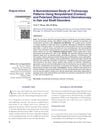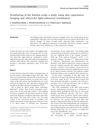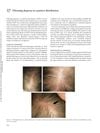 34 citations,
January 2014 in “International Journal of Trichology”
34 citations,
January 2014 in “International Journal of Trichology” Polarized dermoscopy is slightly better than nonpolarized for diagnosing hair disorders, with each method having its own strengths.
December 2020 in “Journal of Face Aesthetics” Trichoscopy effectively helps diagnose different types of hair loss in women.
 2 citations,
July 2018 in “Elsevier eBooks”
2 citations,
July 2018 in “Elsevier eBooks” Trichoscopy is a useful tool for diagnosing and managing hair and scalp conditions, often better than traditional methods.
January 2022 in “Indian Journal of Dermatology”  January 2025 in “Dermatology and Therapy”
January 2025 in “Dermatology and Therapy” UVFT helps diagnose hair and scalp diseases by showing different fluorescence patterns.
April 2023 in “International journal of molecular sciences” People with Collagen VI-related myopathies may often have hair loss and scalp issues.
 14 citations,
January 2015 in “Skin appendage disorders”
14 citations,
January 2015 in “Skin appendage disorders” Misdiagnosis of LPP in AGA patients can cause hair transplant issues.
 18 citations,
February 2017 in “Journal of Cosmetic Dermatology”
18 citations,
February 2017 in “Journal of Cosmetic Dermatology” Mesotherapy for hair loss can sometimes cause more hair loss and scarring.
 July 2021 in “Indian journal of dermatopathology and diagnostic dermatology”
July 2021 in “Indian journal of dermatopathology and diagnostic dermatology” Trichoscopy is a reliable method for diagnosing hair and scalp disorders quickly and non-invasively.
 July 2023 in “Al-Azhar Assiut Medical Journal”
July 2023 in “Al-Azhar Assiut Medical Journal” Trichoscopy helps diagnose and manage hair and scalp disorders in children.
 January 2025 in “Journal of Fungi”
January 2025 in “Journal of Fungi” Advanced dermoscopy techniques improve diagnosis and treatment monitoring for Kerion celsi but don't guarantee full hair regrowth.
 243 citations,
September 2016 in “Dermatology and Therapy”
243 citations,
September 2016 in “Dermatology and Therapy” Dermoscopy is a useful tool for identifying features of skin conditions, but more research is needed to define its role in dermatology.
 September 2021 in “CRC Press eBooks”
September 2021 in “CRC Press eBooks” CCCA is a common hair loss condition in African American women, often inherited and influenced by hairstyling, with unique scalp features detectable by special tools.
 December 2024 in “Journal of Skin and Stem Cell”
December 2024 in “Journal of Skin and Stem Cell” Trichoscopy helps diagnose and manage different types of hair loss in the Indian population.
 January 2021 in “Advances in health sciences research/Advances in Health Sciences Research”
January 2021 in “Advances in health sciences research/Advances in Health Sciences Research” Two siblings with gray patch tinea capitis were successfully treated after identifying risk factors.
 2 citations,
October 2023 in “Dermatology practical & conceptual”
2 citations,
October 2023 in “Dermatology practical & conceptual” More research is needed to understand hair and scalp disorders in people with skin of color.
 9 citations,
January 2020 in “Skin appendage disorders”
9 citations,
January 2020 in “Skin appendage disorders” Hair loss from conditions like LPP and FFA can potentially be reversed with the right treatment.
 68 citations,
August 2012 in “Journal of the American Academy of Dermatology”
68 citations,
August 2012 in “Journal of the American Academy of Dermatology” Dermatoscopy is a useful tool for diagnosing hair disorders and can help choose samples for more detailed analysis.
 October 2023 in “Dermatology practical & conceptual”
October 2023 in “Dermatology practical & conceptual” Many patients experienced hair loss after COVID-19, with women affected more, starting on average 49 days post-infection.
2 citations,
January 2021 in “Journal of The American Academy of Dermatology” A simple scalp scraping can effectively distinguish fibrosing alopecia from androgenetic alopecia with seborrheic dermatitis.
 19 citations,
July 2009 in “Clinical and Experimental Dermatology”
19 citations,
July 2009 in “Clinical and Experimental Dermatology” The study found that long-term sun exposure does not significantly affect follicular plugs on the scalp, and the scalp's appearance is unique compared to other body parts.
 November 2023 in “International Journal of Trichology”
November 2023 in “International Journal of Trichology” Trichoscopic features help diagnose and assess female pattern hair loss severity, with inflammation playing a key role.
 August 2024 in “Journal of Clinical Medicine”
August 2024 in “Journal of Clinical Medicine” Pruritus is common in LPP and FFA, worsened by heat and stress, and relieved by cold, affecting quality of life.
124 citations,
July 2017 in “eLife” Type XVII collagen helps control skin cell growth and could be a target for anti-aging treatments.
 82 citations,
March 2012 in “Development”
82 citations,
March 2012 in “Development” Drosha and Dicer are essential for hair follicle health and preventing DNA damage in skin cells.
 April 2012 in “Informa Healthcare eBooks”
April 2012 in “Informa Healthcare eBooks” Fibrosing alopecia in a pattern distribution is a unique hair loss condition with inflammation and scarring, resembling but distinct from common balding.
 153 citations,
October 2007 in “Cell Stem Cell”
153 citations,
October 2007 in “Cell Stem Cell” New research suggests that skin cell renewal may not require a special type of cell previously thought to be essential.
 2 citations,
May 2014 in “Journal of the Egyptian Women's Dermatologic Society (Print)”
2 citations,
May 2014 in “Journal of the Egyptian Women's Dermatologic Society (Print)” Dermoscopy helps diagnose different scalp conditions by showing unique signs for each disorder.
 47 citations,
September 2015 in “Cell Cycle”
47 citations,
September 2015 in “Cell Cycle” Different skin stem cells help heal wounds, with hair follicle cells becoming more important over time.
 7 citations,
January 2009 in “International Journal of Trichology”
7 citations,
January 2009 in “International Journal of Trichology” Dermoscopy can't help doctors identify scalp irritation caused by topical minoxidil.
























